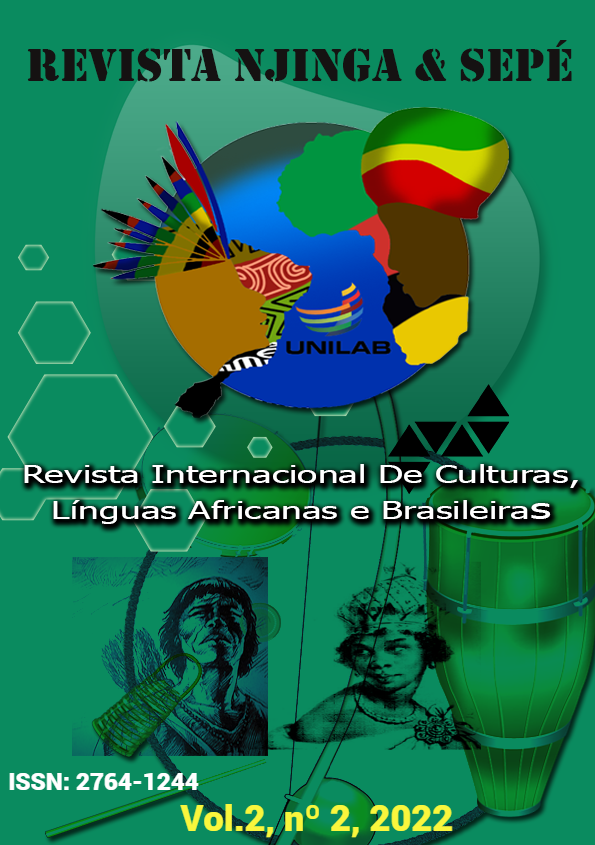2.Descrição do aumento em Umbundu (R10)
Etetandaka lyumbundu (R10)
Mots-clés :
Substantivo, Aumento, Obrigatoriedade, UmbunduRésumé
O estudo da descrição do aumento em Umbundu (R10), língua falada em Angola, na Região do Planalto Central é a língua dos Ovimbundu. Apoiando-se na descrição linguística e pesquisa bibliográfica, identificar a presença e a ausência do aumento, configura-se como objetivo principal. A análise mostra que o aumento é obrigatório nos substantivos começando por um prefixo consonântico e, é ausente sempre diante dos prefixos substantivais começando por uma vogal. Também é ausente diante os prefixos de substantivos locativos, antropônimos, topônimos e nas palavras de segunda coluna sintática, isto é, ausente diante de prefixos pronominais. A presença do aumento é harmônica e não significativa.
***
Etetandaka lyumbundu: Ekonomwiso lyupange owu lyalitumbika kevokiyo lyUmbundu (R10), elimi livangwiwa voNgola, capyãla enene vocakati cofeka kwenje elimi lyatyamela kOvimbundu. Upange owu waseveta kekonomwiso lyalimi lomunga yovikongamela, kokulekisa emoleho lekambo lyevokiyo likasi ndocimãho cupange owu. Etaliliyo eli lilekisa okuti evokiyo lyaco likasi ndesiliñginyo kolonduko vifetika letayo kwenje litakata lika kovaso yafetinduko onepa, olonduko vyomanu, ovitumãlo kwenda kolondaka vyocisoko cavali culalandaka, cilomboloka okuti, vitakatavo kovaso yafeti ndekase. Emoleho lyevokiyo lyece lika eposo pwãyi kalinena epongoloko.
Téléchargements
Références
GUTHRIE, Malcolm. Comparative Bantu: an introduction to the comparative linguistics and prehistory of the Bantu languages. 4vols. Letchworth UK & Brookfield VT: Gregg International,1967-71.
INE. Dados do censo populacional e Habitacional de Angola. Luanda: INE, 2014.
KAPITANGO, Jorge. Sistema fonético e fonológico da língua Umbundu (R11) na variante Ombalundu, FLCS-UAN, Luanda, 2009.
MFUWA, Ndonga. Sistématique gramaticale du kisikongo (Angola). Doctorat, Université de Sorbonne, Paris V.1995.
MUTAKA, Ngessimo M.; TAMANJI, Pius N. An introduction to African Linguistics. Lincom handbooks in linguistics, nº 16. Munich: Lincom Europa, 2000.
MUZENGA, Kamba, J. G. (1980). Esquisse de grammaire Kete. Musée royal de l’Afrique central, Tervuren, Bélgique, 1980.
NGUNGA, Armindo. Introdução à Linguística Bantu. Maputo: Imprensa Universitária, 2004.
NGUNGA, Armindo; SIMBINE, Madalena Cintia. Gramática Descritiva da língua Changana, Maputo: CEA, UEM, 2012.
OBENGA, Théophile. Les Bantu. Langues, peuples, civilisations, Paris: Présence Africaine, 1985.
RIBEIRO LAMAS, Estela Pinto. Dicionário de Metalinguagem da Didáctica. Porto: Porto Editora, 2000.
SASSUCO, Daniel Peres. La forme nominale, verbale et syntaxe du Cokwe (K10). Dissertação, Universidade Autônoma de Barcelona. Barcelona: UAN, 2008.
Téléchargements
Publiée
Comment citer
Numéro
Rubrique
Licence
(c) Tous droits réservés NJINGA&SEPÉ: Revista Internacional de Culturas, Línguas Africanas e Brasileiras 2022

Ce travail est disponible sous licence Creative Commons Attribution - Pas d'Utilisation Commerciale - Pas de Modification 4.0 International.
Les auteurs qui publient dans cette revue acceptent les conditions suivantes:
Les auteurs conservent le droit d'auteur et accordent à la revue le droit de première publication, l'œuvre étant simultanément concédée sous licence Creative Commons Attribution License, qui permet le partage de l'œuvre avec reconnaissance de la paternité de l'œuvre et publication initiale dans ce magazine.
Les auteurs sont autorisés à assumer séparément des contrats supplémentaires, pour la distribution non exclusive de la version de l'ouvrage publié dans cette revue (par exemple, publication dans un référentiel institutionnel ou en tant que chapitre de livre), avec reconnaissance de la paternité et publication initiale dans cette revue.
Les auteurs sont autorisés et encouragés à publier et distribuer leurs travaux en ligne (par exemple dans des référentiels institutionnels ou sur leur page personnelle) à tout moment avant ou pendant le processus éditorial, car cela peut générer des changements productifs, ainsi que citation des travaux publiés (voir l'effet du libre accès).




